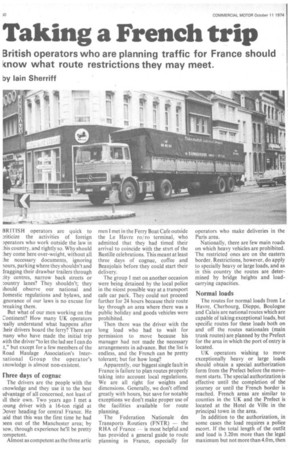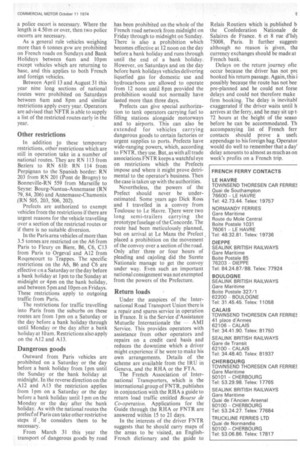Taking a French trip
Page 52

Page 53

If you've noticed an error in this article please click here to report it so we can fix it.
British operators who are planning traffic for France should know what route restrictions they may meet.
by lain Sherriff
BRITISH operators are quick to :laicize the activities of foreign sperators who work outside the law in his country, and rightly so. Why should :hey come here over-weight, without all he necessary documents, ignoring -lours, parking where they shouldn't and hugging their drawbar trailers through ity centres, narrow back streets or ;ountry lanes? They shouldn't; they ;hould observe our national and lomestic regulations and bylaws, and gnorance of our laws is no excuse for breaking them.
But what of our men working on the Continent? Flow many UK operators -eally understand what happens after :heir drivers board the ferry? There are nany who have made the initial trip ivith the driver "to let the lad see I can do t," but except for a few members of the Road Haulage Association's Interlational Group the operator's (nowledge is almost non-existent.
fliree days of cognac
The drivers are the people with the cnowledge and they use it to the best idvantage of all concerned, not least of ll their own. Two years ago I met a (oung driver with a 16-ton rigid at Dover heading for central France. He ;aid that this was the first time he had seen out of the Manchester area; by low, through experience he'll be pretty :ompetent.
Almost as competent as the three artic men I met in the Ferry Boat Cafe outside the Le Havre ro/ro terminal, who admitted that they had timed their arrival to coincide with the start of the Bastille celebrations. This meant at least three days of cognac, coffee and Beaujolais before they could start their delivery.
The group I met on another occasion were being detained by the local police in the nicest possible way at a transport cafe car park. They could not proceed further for 24 hours because their route lay through an area where there was a public holiday and goods vehicles were prohibited.
Then there was the driver with the long load who had to wait for permission to move because his manager had not made the necessary arrangements in advance. But the list is endless, and the French can be pretty tolerant; but for how long?
Apparently, our biggest single fault in France is failure to plan routes properly taking into account local regulations. We are all right for weights and dimensions. Generally, we don't offend greatly with hours, but save for notable exceptions we don't make proper use of the facilities available for route planning.
The Federation Nationale des Transports Routiers (FNTR) — the RHA of France -is most helpful and has provided a general guide to route planning in France, especially for operators who make deliveries in the Paris area.
Nationally, there are few main roads on which heavy vehicles are prohibited. The restricted ones are on the eastern border. Restrictions, however, do apply to specially heavy or large loads, and as in this country the routes are determined by bridge heights and loadcarrying capacities.
Normal loads
The routes for normal loads from Le Havre, Cherbourg, Dieppe, Boulogne and Calais are national routes which are capable of taking exceptional loads, but specific routes for these loads both on and off the routes nationales (main trunk routes) are planned by the Prefect for the area in which the port of entry is located.
UK operators wishing to move exceptionally heavy or large loads should obtain a special. authorization form from the Prefect before the movement starts. The special authorization is effective until the completion of the journey or until the French border is reached. French areas are similar to counties in the UK and the Prefect is located at the Hotel de Ville in the principal town in the area.
In addition to the authorization, in some cases the load requires a police escort. If the total length of the outfit and load is 3.20m more than the legal maximum but not more than 4.0m, then a police escort is necessary. Where the length is 4.50m or over, then two police escorts are necessary.
As a general rule vehicles weighing more than 6 tonnes gvw are prohibited on French roads on Sundays and Bank Holidays between 6am and 10pm except vehicles which are returning to base, and this applies to both French and foreign vehicles.
Between April 13 and August 31 this year nine long sections of national routes were prohibited on Saturdays between 6am and 8pm and similar restrictions apply every year. Operators are advised that NFTR is able to supply a list of the restricted routes early in the year.
Other restrictions
In addition to these temporary restrictions, other restrictions which are still in operation take in a number of national routes. They are RN 113 from Beziers to RN 610: RN 114 from Perpignan to the Spanish border: RN 203 from RN 201 (Pont de Brogny) to Bonneville-RN 559 from Marseille to Seyne: Bourg-Nantua-Annemasse (RN 79, 84, 206) and Annemasse-Chamonix (RN 505, 203, 506, 202).
Prefects are authorized to exempt vehicles from the restrictions if there are urgent reasons for the vehicle travelling over a section of the restricted routes or if there is no suitable diversion.
In the Paris area vehicles of more than 3.5 tonnes are restricted on the A6 from Paris to Fleury en Biere, B6, C6, C13 from Paris to Orgeval and A I 2 from Roqencourt to Trappes. The specific restrictions on the A6, B6 and C6 are effective on a Saturday or the day before a bank holiday at 1 pm to the Sunday at midnight or 4pm on the bank holiday, and between 5pm and 1 Opm on Fridays. These restrictions apply to outgoing traffic from Paris.
The restrictions for traffic travelling into Paris from the suburbs on these routes are from 1pm on a Saturday or the day before a bank holiday through until Monday or the day after a bank holiday at 10 am. Restrictions also apply on the Al2 and A13.
Dangerous goods
Outward from Paris vehicles are prohibited on a Saturday or the day before a bank holiday from 1 pm until the Sunday or the bank holiday at midnight. In the reverse direction on the A 12 and A 1 3 the restriction applies from I pm on a Saturday or the day before a bank holiday until 1 pm on the Monday or the day after the bank holiday. As with the national routes the prefect of Paris can take other restrictive steps if he considers them to be necessary.
From March 31 this year the transport of dangerous goods by road has been prohibited on the whole of the French road network from midnight on Friday through to midnight on Sunday. There is also a prohibition which becomes effective at 12 noon on the day before a bank holiday and runs through until the end of a bank holiday. However, on Saturdays and on the day before bank holidays vehicles delivering liquefied gas for domestic use and hydrocarbons are allowed to operate from 12 noon until 8pm provided the prohibition would not normally have lasted more than three days.
Prefects can give special authorization to tank operators carrying fuel to filling stations alongside motorways and to airports. This can also be extended for vehicles carrying dangerous goods to certain factories or urgent supplies to ports. Prefects have wide-ranging powers, which, according to FNTR, they use. But, as with all trade associations FNTR keeps a watchful eye on restrictions which the Prefects impose and where it might prove detrimental to the operator's business. Then the case is taken up with the authorities.
Nevertheless, the powers of the Prefect should never be underestimated. Some years ago Dick Ross and I travelled in a convoy from Toulouse to Le Havre. There were two long semi-trailers carrying the prototype fuselage of the Concorde. The route had been meticulously planned, but on arrival at Le Mans the Prefect placed a prohibition on the movement of the convoy over a section of the road. Only after three or four hours of pleading and cajoling did the Surete Nationale manage to get the convoy under way. Even such an important national consignment was not exempted from the powers of the Prefecture.
Return loads
Under the auspices of the International Road Transport Union'there is a repair and spares service in operation in France. It is the Service &Assistance Mutuelle Internationale the AMI Service. This provides operators with assistance from other operators and repairs •on a credit card basis and reduces the downtime which a driver might experience if he were to make his own arrangements. Details of the scheme are available from the IRU in Geneva, and the RHA or the FTA.
The French Association of International Transporters, which is the international group of FNTR, publishes in conjunction with the RH A a guide to return load traffic entitled Bourse de Co-operation. Applications for the Guide through the RHA or FNTR are answered within 15 to 21 days.
In the interests of the driver FNTR suggests that he should carry maps of the areas to be visited, an EnglishFrench dictionary, and the guide to Relais Routiers which is published b the Confederation Nationale de Salaires de France. 6 et 8 rue d'Is15 75008, Paris. It further suggest although no reason is given, tha currency exchanges should be made at French bank.
Delays on the return journey ofte occur because the driver has not pre booked his return passage. Again, this i possibly because the route has not bee. pre-planned and he could not forse delays and could not therefore make firm booking. The delay is inevitabl exaggerated if the driver waits until h arrives at the ferry, and he may sit up t 72 hours at the height of the seaso before he can be accommodated. Th accompanying list of French ferr contacts should prove a useft appendage to his foreign bag, Operator would do well to remember that a day' delay amounts to almost as much as on week's profits on a French trip.




























































































































































